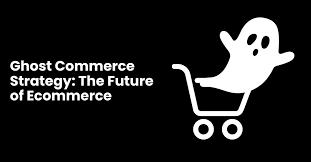Ghost Ecommerce enables businesses to tap into the vastly growing online shopping market. However, setting up and managing an online store can be complex and resource-intensive. This is where ghost commerce providers step in to provide easy ecommerce solutions.
But what exactly is ghost commerce and how does it work? Let’s find out.
Ghost commerce has emerged as a convenient ecommerce solution for businesses to establish an online presence without major investments. But what exactly is ghost commerce and how does this outsourced ecommerce model work?
What is Ghost Commerce?
Ghost commerce refers to white label ecommerce services offered by providers to set up and run online stores on behalf of businesses. The term “ghost” denotes that the ecommerce operations are managed behind-the-scenes by the provider, without requiring extensive in-house resources.
With ghost commerce, providers handle key ecommerce functions including:
- Building and hosting your customized online storefront
- Configuring the product catalog
- Managing inventory and order processing
- Facilitating payments, shipping and returns
- Providing customer service
- Managing marketing activities
Essentially, you create and own the products while the provider handles everything required to operate the online store, from technology to fulfillment. This enables easy ecommerce without upfront investments into development, hosting, inventory or fulfillment.
How Does Ghost Commerce Work?
The workings of ghost commerce platforms can be summarized in the following steps:
Onboarding
The process starts with you signing up with a ghost commerce provider like Exogrow Solutions. You outline your ecommerce needs and business details.
Store Setup
The provider then sets up your customized online storefront reflecting your brand. This includes configuring the visual design, content, payment integration, backend inventory and order management.
Product Catalog Creation
Next, you create and upload your product catalog to the store backend, with product images, pricing, description and other details.
Marketing and Promotion
Your store is marketed across channels like search, social, email marketing and affiliate networks by the provider to generate traffic and sales.
Order Management
As orders get placed, the provider manages payment processing, confirmations, shipping and customer communication related to orders.
Fulfillment
Physical order fulfillment is enabled either via dropshipping or integration with your warehouse/fulfillment center.
Customer Support
The provider also offers customer support for queries, returns, refunds etc. to drive customer satisfaction.
Analytics and Reporting
You gain access to analytics for traffic, conversions, revenue etc. to monitor performance and identify areas of improvement.
Essentially the provider takes care of the technology and operational aspects, while you focus on creating great products for your ecommerce business.
Benefits of Ghost Commerce
Ghost commerce offers several advantages over traditional self-managed ecommerce models:
Quick Launch
You can get your ecommerce store up and running within weeks without any technical lift.
Lower Cost
There is no need for upfront investments into development, hosting, inventory or fulfillment costs.
Operational Efficiency
Time consuming tasks like order processing, customer service and logistics are handled by the provider.
Omnichannel Commerce
Providers facilitate smooth omnichannel commerce across web, mobile, in-store and other channels.
Scalability
The outsourced model allows you to easily scale up or down based on seasonal variations in demand.
Focus on Core Business
You can stay focused on your core competence – creating great products, while store operations are outsourced.
For retailers new to ecommerce, ghost commerce enables testing the waters before making major investments in-house. It provides easy plug-and-play ecommerce capabilities.
Choosing the Right Ghost Commerce Provider
When selecting a ghost commerce partner, some key aspects to evaluate include:
Services Offered
Choose a provider offering end-to-end services from storefront creation to order delivery.
Technical Capabilities
Assess their ecommerce platform strengths from both customer-facing storefront and backend inventory/order management.
Integration Support
Review their integration capabilities with payment gateways, shipping providers, POS systems and other channels.
Reliability and Support
Opt for providers offering 24×7 customer support and an dedicated account representative.
Pricing Model
Evaluate their pricing in terms of monthly fees, onboarding costs, transaction fees and other charges.
Clientele and Reviews
Research their experience across industries and client testimonials validating service quality.
By thoroughly evaluating these parameters, retailers can identify the ideal ghost commerce partner to match their ecommerce requirements. The right provider can effectively streamline your path to online retail.
Ghost commerce Conclusion
Ghost commerce enables retailers to capitalize on ecommerce without the need for significant in-house investment or resources. With an experienced provider managing the ecommerce operations, retailers can focus on creating a compelling product catalog and brand experience. However, sufficient due diligence is recommended in choosing a reliable long-term ecommerce partner. Overall, ghost commerce simplifies the route for businesses to establish an online presence and expand their reach.

Recent Comments